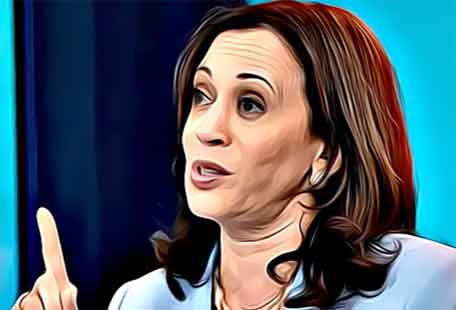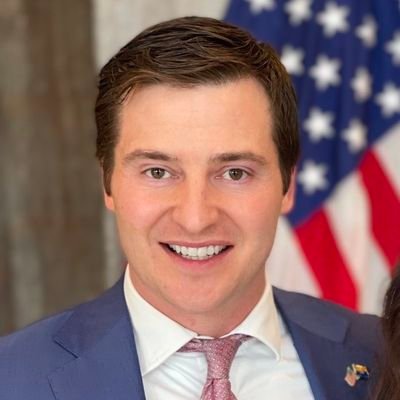
Kamala Harris is losing the fight for the American middle.
In the latest New York Times/Siena College poll, a plurality of respondents — 44% — label her "too liberal or progressive."
Only 42% say she's "not too far either way," compared to a solid 50% who say that about Donald Trump.
But it's not only voters who think Harris is too far left; the vice president herself agrees.
That's why she's running like a wannabe Republican, even welcoming support from Liz and Dick Cheney.
She's tried to make "freedom," the traditional rallying cry of conservatives, her campaign's watchword.
The newly contrived policy pages of Harris' website downplay what she and Joe Biden have actually done these last four years and instead emphasize what she says she'll do if elected in November.
The section is titled "A New Way Forward" despite the fact that she's already in power — and, given Biden's debility, Harris is more than just a junior partner at this point.
In the four years she served in the Senate, independent analysts graded Harris one of the body's most liberal members, or its single most liberal.
Now, however, Harris is trying to co-opt classic Republican issues, with the first heading on her policy page promising to "cut taxes for middle class families."
The actual policy is effectively plagiarized from Trump's running mate: after J.D. Vance proposed a $5,000 child tax credit for families, the Harris camp rolled out a $6,000 credit.
Harris, a candidate who famously wanted to ban fracking when she ran for president four years ago, isn't just backtracking on her record and attempting to sound like a member of the opposite party.
She wants to switch places with the GOP, branding Trump as the high-tax candidate.
To do that, Harris' camp is claiming that the tariffs Trump would impose on foreign goods are really taxes Americans will have to pay.
Some free-market pundits hate tariffs, and Trump, so much that they're going along with this argument, even though elementary economic theory shows it's wrong.
A tariff makes a foreign product more expensive — but consumers don't magically wind up with more money in their pockets when prices rise.
And a higher price doesn't make a product more attractive, but just the opposite; if prices rise, demand falls.
Companies, meanwhile, whether foreign or domestic, always try to set their prices to make maximum profit; they don't underprice their goods.
If a business could sell as many widgets by charging $11 instead of $10, it would already be charging that much, regardless of tariffs.
A producer can only "pass on" the cost of a tariff if consumers are willing and able to pay more for the same product they've already been buying — yet if they were willing to pay more, the producer would already be charging more and making a higher profit.
It's the company's profit, not the consumer price, that's most heavily affected by a tariff.
And if the price consumers are asked to pay does go up, they have alternatives: what economists call "substitute goods."
When tariffs are put on foreign goods, domestic goods become a substitute, though it's also possible that consumers might substitute an entirely different kind of product.
If there's a tariff on Golden Delicious apples, consumers might switch to Granny Smiths, or they might start buying oranges instead.
To make her case, Harris is counting on the widespread economic ignorance and the prejudices of market-minded pundits who will conveniently forget all they know about price theory when the despised word "tariffs" — or "Trump" — is spoken.
Free-market purists dislike tariffs because they reduce the overall quantity of goods: If companies pay tariffs out of their profits, they don't have as much money to invest in new production, and if companies try to raise prices, consumers don't buy as much as they used to.
There's also a fear that, in protected markets, domestic producers will be able to charge more simply because there's less competition.
But the opportunity to make more profit in a protected market is also an incentive for more domestic firms to enter that market, which again puts downward pressure on prices and increases the volume of goods.
Trump may expect too much from his tariffs — both in terms of revenue and how much they'll bolster domestic production.
But it's foreign profits and foreign production that are squeezed the most by tariffs, not American consumers.
Trump means tariffs, yes — but Harris means things like a 25% tax on unrealized capital gains.
Polls show Harris's attempt to sell herself as a Reaganesque Democrat is failing.
Free-market advocates can't afford to be less perceptive than the ordinary voters who recognize Harris is too far left.
(COMMENT, BELOW)
Previously:
• 09/04/24: Where Trump Is Moderate -- While Kam Is Maximalist
• 08/27/24: Donald Trump Is Reagan's Heir
• 08/20/24: Will Voters Settle for Joe Biden's Wing(wo)man?
• 08/13/24: Trump Has to Run Like It's 2016 Again
• 08/07/24: Is Trump Running Against Harris -- or Donald Trump?
• 07/30/24: Kamala Harris' 'Mean Girls' Election
• 07/23/24: Kamala Harris Is the Opponent Donald Trump Wants
• 07/16/24: Ready for Biden's Counterattack?
• 07/09/24: Biden Faces Richard Nixon's Choice
• 07/02/24: Should Biden Drop Out -- or Resign?
• 06/18/24: Separate Sexual Identity and State
• 06/18/24: Nigel Farage Makes the Trump Moment Permanent
• 06/04/24: State that's long eluded GOP turns toward Trump
• 05/21/24: Trump's Sun Belt Hopes and Rust Belt Needs
• 05/14/24: What Trump Sees in Doug Burgum
• 05/07/24: The Vietnam Era Never Ended for Biden's Party
• 05/06/24: Nationalists of the World, Unite?
• 04/25/24: Foreign Policy Splits
• 04/16/24: How pro-lifers stand to lose everything gained in overturning Roe
• 04/02/24: PBS Misremembers William F. Buckley Jr.
• 04/02/24: Who Wants to Be House Speaker?
• 03/26/24: Trump Hunts for a VP Close to Home
• 03/19/24: Princess Kate and Democracy's Discontents
• 03/12/24: Can Biden Buy the Voters?
• 03/05/24: Veepstakes Give Trump an Edge
• 02/20/24: Do Americans Trust Either Party?
• 02/13/24: Vladimir Putin -- A Passive Aggressor
• 01/23/24: Will 'Lawfare' Take Trump Off the Ballot?
• 01/16/24: Will Africa Save America?
• 01/09/24:'The Sopranos' at 25: A new world tragedy
• 01/02/24: Trump, Biden and a Fight for the Heart
• 12/12/23: What Happened to Ron DeSantis?
• 12/12/23: Biden Looks Doomed -- But Is He?
• 12/05/23: A Test for Trump and His Rivals
• 11/21/23: When Inequality Is Fatal for Men
• 11/14/23: Nevermind, The Battle's Over
• 11/07/23: War in the Dem Party -- and at the Opera
• 10/24/23: Israel's Lesson for 2024: A Lib Crackup
• 10/17/23: Libs' Dilemma: Immigration or Israel?
• 10/10/23: Why Bidenflation Defines Bidenomics
• 10/03/23: Will Gavin Newsom Copy Trump?
• 09/26/23: Biden's a Loser -- but Dems Can't Ditch Him
• 09/19/23: Do Sex Scandals Matter?
• 09/12/23: Cornel West Spells Doom for Biden
• 09/05/23: What Trump Does for Democracy
• 08/2/23: Ramaswamy: A Trump Versus Trump?
• 08/22/23: Take 'Rich Men North of Richmond' Seriously
• 08/16/23: How America Kills Its Own
• 08/08/23: The Biden Pardon That Can Spare America
• 08/01/23: Harding, a consevative for the ages
• 07/25/23: Demography Destiny, for Us and China
• 07/18/23: The Frontrunner Who Looks Like a Loser Is Biden
• 07/11/23: Britain's Bad Example for American Conservatives
• 07/05/23: Could We Still Win a Revolutionary War?
• 06/27/23: Civilizations Clash -- in Ukraine and at Home
• 06/20/23: China Comes for the Caribbean
• 06/13/23: Fertility, Family and Bio-Socialism
• 06/06/23: From American Dream to Orwell's Nightmare
• 05/23/23: Ukraine war is an existential struggle --- for the West
• 05/23/23: Learn the Right Midterm Lessons -- or Lose in 2024
• 05/16/23: Feinstein Today Is Biden Tomorrow
• 05/09/23: Trump, DeSantis and Political Courtship
• 05/02/23: RFK Jr.'s Threat to Biden
• 04/25/23: Biden's Lost Generation
• 04/25/23: Who's In Charge of Clarence Thomas?
• 04/11/23: Beyond AI, Our Cyborg Future
• 04/04/23: 2024: 3 Leaders, 1 Way to Win
• 03/28/23: Climate Science Makes a Bad Religion
• 03/21/23: All the Conspiracy That's Fit to Print


 Contact The Editor
Contact The Editor
 Articles By This Author
Articles By This Author